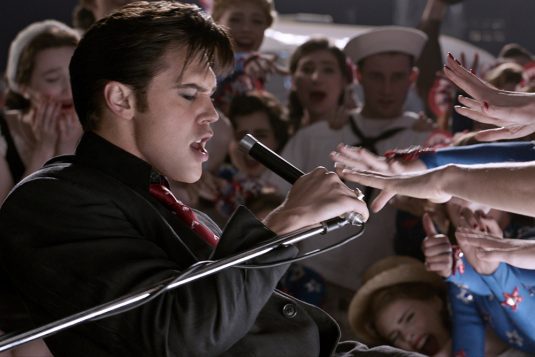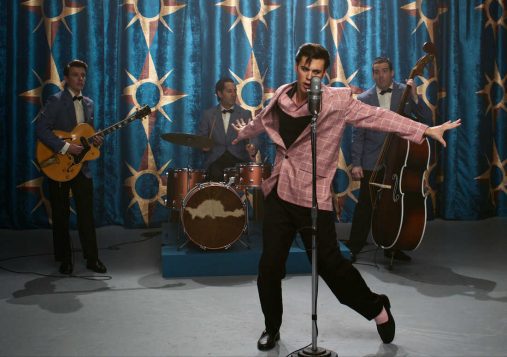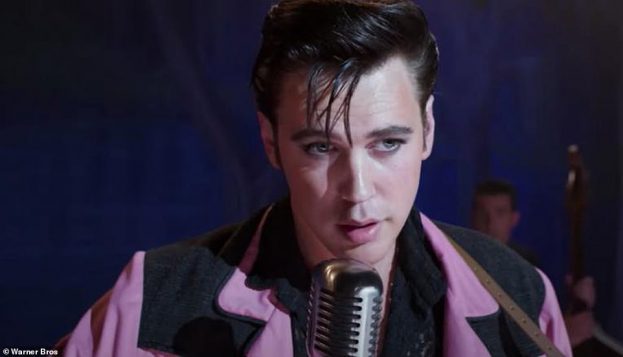Movie Review: Paying tribute to the King of Rock & Roll in ‘Elvis’
Reviewed by Jeffrey Sanzel
Australian auteur Baz Luhrmann has left his kinetic imprint on a range of cinematic works. Known for his bold visual style and thumping soundtracks, William Shakespeare’s Romeo + Juliet (1996), Moulin Rouge! (2001), and The Great Gatsby (2013) are among his most prominent projects. With Elvis, he has turned his sights on one of the most iconic performers of the twentieth century. Working from a screenplay co-written with Sam Bromell, Craig Pearce, and Jeremy Doner, Luhrmann presents an almost hagiographic portrait, smoothing out many of the rougher edges.
Elvis begins with Luhrmann’s usual frenetic assault. Slow-motion, quick cuts, aggressive music, and even a dissolve into a comic book set the tone for an original, if over-the-top, approach. However, within thirty minutes, the film settles into a traditional biography with only occasionally departing from a straight narrative. It becomes surprisingly pedestrian, given Luhrmann’s signature style. Predictable montages with cities superimposed on a map indicating travel seem a throwback to films of a previous century. Perhaps this is to put the action in its time, but it leans more towards creaky than homage.
The film tells the story from the perspective of Elvis’s agent, Colonel Tom Parker (Tom Hanks). He serves as narrator and villain, tracing the singer from his poverty-ridden childhood through Parker’s elevation of the singer and Elvis’s meteoric rise. Much is made of Elvis’s fascination with African-American music of Memphis’s Beale Street. The huckster Parker becomes guide and gatekeeper to the naive young man, with something Faustian about the story: Parker as a corpulent Mephistopheles making dreams come true.
The film covers little new ground. In two and a half hours of playing time, Elvis reveals bits and pieces but never creates a full portrait of any of its characters. Luhrmann pulls his punches, making Elvis an almost benevolent figure, eschewing many darker elements. The drugs and sex are touched upon but then relegated to the background. While Parker states that Elvis was “the taste of forbidden fruit,” these are seen only in sanitized glimpses.
The greatest star of many generations was the victim of bad choices and insidious management. There are harrowing moments—particularly when his father decides to get him on stage when he should be in a hospital. But these moments are too few and far between. Instead, the movie focuses on performances and the push-pull relationship between the manager and the managed. Nods are made to Elvis’s devastation over the assassinations of Martin Luther King, Jr., and Robert Kennedy and his desire to make bigger statements. But they are skimmed over.
His career is played in fast-forward, his army service and movies receiving only perfunctory glances, segueing to television, and finally to Vegas. The Steve Allen debacle, with Elvis in tails singing to a hound dog, makes for a decisive moment, and the entire residency at the International Hotel receives more than a cursory treatment.
Tom Hanks gets points for giving the least “Tom Hanks” performance of his career. His almost freakish Parker is an obese fat suit and distorting prosthetics, calling to mind Jiminy Glick or Danny DeVito as the Penguin. The shadowy “Colonel” was a fraud and a charlatan, not southern but Dutch. For some strange reason, Hanks opted for an untraceable European accent (and sounding nothing like any of the available clips of the real Parker). One expects lines like “He’s the greatest carnival attraction I’d ever seen; he was my destiny” to be followed by a maniacal laugh. He creeps around the film’s periphery, wandering in his purgatory casino.
In theory, the reason for biographical films is to explore historical figures, acknowledge their accomplishments, explore them in the context of their times, or gain insight into what made them unusual, exceptional, and memorable. However, more often, the films become a celebration of the actors’ work: Daniel Day-Lewis in Lincoln; Jennifer Hudson in Respect; Joaquin Phoenix and Reese Witherspoon in Walk the Line; Rami Malek in Bohemian Rhapsody, etc. Somewhere along the way, the portrayal subsumes the persona.
Austin Butler delivers as Elvis. He captures the King in every look, shift, and shrug. He embodies the roiling doubts and the desire for more. Whether struggling with career choices or trying to care for his dysfunctional parents, he infuses each moment with integrity and star power. His vocals are excellent, and he has found the required nuances. (Butler sings all the earlier songs and then is blended with actual Elvis recordings for the later years.)
By the film’s end, little has been revealed about the man or the myth. There are events and interactions and a bit of trivia but not much depth. Unlike Dexter Fletcher’s Rocketman, the gloriously messy look at Elton John, Elvis chooses not to reflect its subject in style or approach. There is nothing “Elvis” about Elvis. Instead, Baz Luhrmann offers a by-the-numbers biopic with a mesmerizing central performance. It is something, but perhaps not enough.
Rated PG-13, the film is now playing in local theaters.










